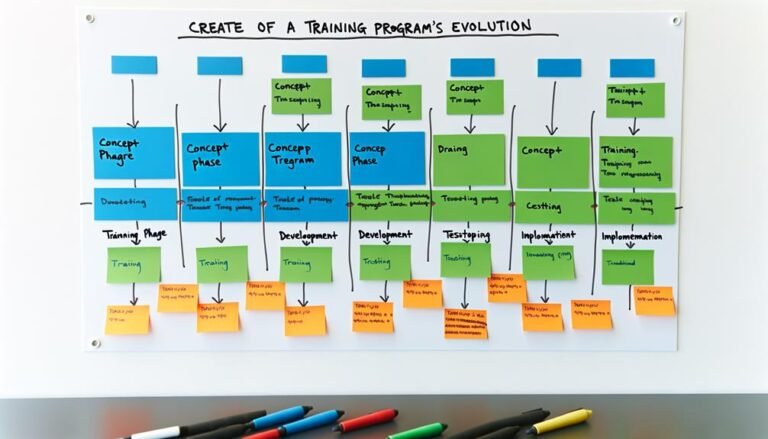Unlocking the Dynamics of Mentor-Mentee Roles
Exploring the intricate dance between mentors and mentees reveals a tapestry woven with guidance, support, and growth. The interplay of roles and responsibilities within this professional symbiosis creates a foundation for success, yet beneath the surface lies a world of nuanced interactions waiting to be unraveled.
Understanding the complexities of mentor-mentee dynamics unveils a realm where learning and development flourish, but also where challenges and obstacles may lurk. Join us as we navigate this landscape to decode the secrets of unlocking the true potential of mentor-mentee relationships.
Key Takeaways
- Clear expectations enhance mentor-mentee roles.
- Effective communication fosters growth and learning.
- Building trust and rapport is vital for success.
- Proactive problem-solving overcomes mentorship challenges.
Importance of Mentorship Roles
Understanding the pivotal significance of mentorship roles is paramount in cultivating a successful and mutually beneficial mentor-mentee relationship. Mentorship impacts not only the mentee's growth but also the mentor's development by fostering a dynamic exchange of knowledge, skills, and experiences.
The relationship dynamics between a mentor and mentee involve more than just guidance; it encompasses mutual learning, trust-building, and goal alignment. Effective mentorship thrives on clear communication, respect, and shared expectations, creating a supportive environment for growth and development.
Establishing Clear Expectations
To lay a solid foundation for a productive and harmonious mentor-mentee relationship, it is essential to establish clear and unambiguous expectations from the outset. Setting boundaries is crucial in defining the scope of the relationship and ensuring both parties understand their roles and responsibilities.
This clarity helps manage expectations regarding the support and guidance the mentor can provide and what the mentee is expected to contribute. Furthermore, managing feedback effectively is essential for growth. Providing constructive feedback in a respectful manner and being open to receiving feedback helps foster a culture of continuous improvement.
Nurturing Effective Communication
Effective communication serves as the cornerstone of a successful mentor-mentee relationship, laying the groundwork for mutual understanding and growth. In this dynamic, providing effective feedback is crucial for both mentors and mentees to exchange insights constructively.
Mentors should offer feedback that is specific, actionable, and focused on behaviors rather than personal traits, fostering mentee development. Conversely, mentees should actively listen to the feedback, showing receptiveness and a willingness to learn and improve.
Active listening, a key component of effective communication, involves fully concentrating, understanding, responding, and remembering what is being said. By nurturing effective communication through the practice of active listening and providing constructive feedback, mentor-mentee relationships can flourish, paving the way for mutual growth and success.
Building Trust and Rapport
Establishing a foundation of trust and rapport is paramount in fostering a strong and effective mentor-mentee relationship. Building rapport involves various key elements:
- Open Communication: Encouraging honest and transparent dialogue.
- Active Listening: Showing genuine interest and understanding.
- Empathy: Understanding and acknowledging the mentee's feelings and perspective.
- Consistency: Maintaining regular contact and follow-ups.
- Respect: Valuing each other's opinions, boundaries, and time.
Overcoming Mentorship Challenges
Navigating through obstacles inherent in mentorship requires a proactive approach and strategic problem-solving mindset. Two key challenges in mentorship are addressing communication barriers and managing conflicting expectations.
Communication barriers can arise due to differences in communication styles, lack of clarity in instructions, or misunderstandings. To overcome this, both mentor and mentee must prioritize clear and open communication, actively listening to each other's perspectives, and providing constructive feedback.
Conflicting expectations can lead to frustration and misunderstandings. It is essential to establish mutual understanding of goals, roles, and boundaries early on in the relationship. Regular check-ins to align expectations, discussing any discrepancies openly, and adjusting goals as needed can help in managing conflicting expectations effectively.
Maximizing Mutual Learning
To optimize the mentor-mentee relationship and derive maximum benefit, a strategic focus on enhancing mutual learning is crucial.
- Collaborative Learning: Engage in shared learning experiences to foster growth for both mentor and mentee.
- Reciprocal Support: Provide and receive support to facilitate development and progress in the mentoring journey.
- Development Opportunities: Seek ways to promote personal and professional growth through knowledge exchange and skill enhancement.
- Knowledge Sharing: Share insights, experiences, and expertise to enrich the learning process for both parties.
- Feedback Loop: Establish a constructive feedback loop to continuously improve and adapt to each other's learning needs and preferences.
Realizing Benefits of Mentorship
Realizing the benefits of mentorship requires a strategic approach that aligns with individual and organizational goals. Mentorship offers a unique opportunity for skill development, where mentees can tap into the knowledge and experience of their mentors to enhance their capabilities.
Through guided learning and hands-on experience, mentees can acquire new skills and refine existing ones, ultimately leading to personal and professional growth. Moreover, mentorship plays a pivotal role in confidence building. Mentors provide support, encouragement, and constructive feedback, empowering mentees to believe in their abilities and take on new challenges with assurance.
As a result, mentorship not only benefits individuals by expanding their skill set but also boosts their self-assurance, paving the way for success in their endeavors.
Conclusion
In the intricate dance of mentor-mentee relationships, the key to unlocking their full potential lies in the establishment of clear expectations, effective communication, and trust.
By navigating challenges with resilience and embracing mutual learning, individuals can reap the benefits of career advancement, skill enhancement, and personal growth.
The symbiotic partnership between mentor and mentee is a powerful catalyst for professional development, offering a pathway to success through collaboration and dedication.







